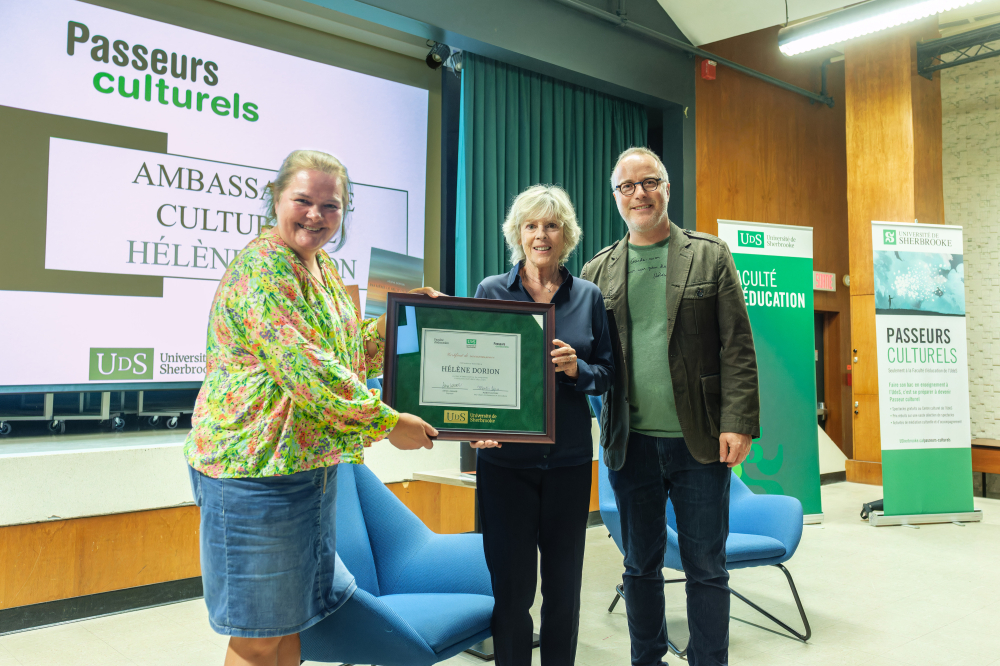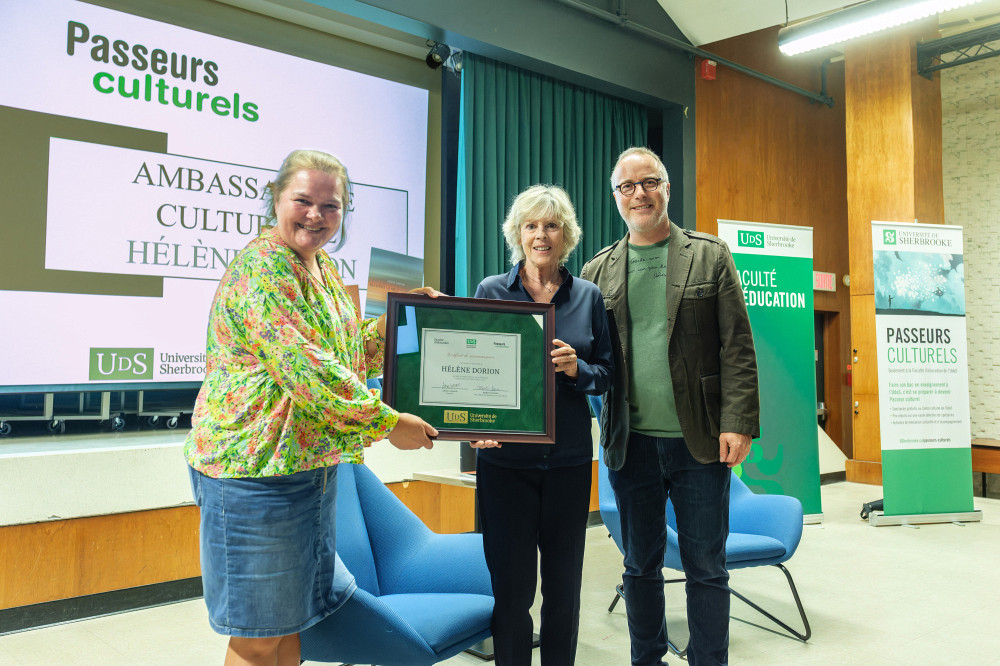
Photo: Michel Caron UdeS
An internationally famous writer joins the UdeS Faculty of Education to promote training, art and culture! Convinced of the importance of culture in education and in life, Hélène Dorion, a Quebec poet and writer, generously accepted the honorary title of ambassador of the Cultural Passeurs program to make it shine even more, regionally, nationally and internationally.
On Wednesday, October 4, it was the Great Meeting with Hélène Dorion, brilliantly led by Félix Morin, graduate of pre-school and elementary education at UdeS and very involved as a cultural transmitter as a teacher at Cégep de Sherbrooke. Professor Martin Lépine, vice dean of the Faculty of Education, is the initiator of this initiative.
It is an honor to offer the honorary title of ambassador of the Cultural Passeurs program to such an important author as Hélène Dorion. Integrating cultural dimensions into educational training gives more meaning and flavor to learning. Through the Cultural Passeurs program, it is of course about supporting the development of professional skills, but above all about cultivating tastes, appetites, desires, desires so that as many people as possible have a taste for lifelong learning. .
Martin Lépine, vice dean for teaching and culture at the Faculty of Education
With this title, Hélène Dorion wants to use this opportunity to share her passion for culture and contribute to strengthening its necessity in education and society.
I am very grateful and continue to be amazed by the position I have been given here at the Faculty of Education. I immediately saw the consistency of my whole approach and fit with my vision. I want to take advantage of this opportunity offered to me to share my cultural and literary passion and to contribute to the inculcation of what I believe is the need for the teachers and students of tomorrow to take a place in their school and civic lives. Culture.
Hélène Dorion, Quebec poet, writer and essayist
She also declares that it seems to her that the world we live in requires new connections, exchanges that question the limitations that are sometimes imposed and, above all, calls for new forms of solidarity in order to better understand current issues and better align our actions with what concerns and affects each of us.
Sharing passion and enthusiasm through teaching
Having already been a CEGEP teacher, with experience in philosophy and literature, the writer shares that her writing practice has greatly influenced her way of teaching. For her, this sharing of passion and literary zeal is extremely important and goes beyond teaching method.
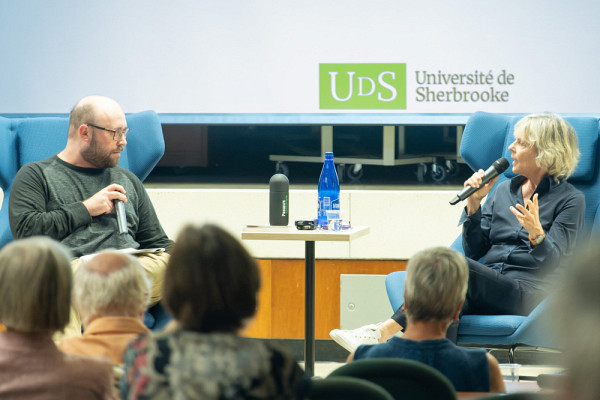
Photo: Michel Caron UdeS
That passion and that ardor mean that I said how important literature is for understanding the world, for dialogue with the entire contemporary world, for friendly, romantic, family, social relationships. That subject, verb and object determine so many things in our life.
How did she manage to transfer that enthusiasm to the students? The poet tells us that students want to know the usefulness of things in a rather specialized and precise field: what will it do for me for an exam, for a diploma, for a profession… She assumes that culture can be adapted to all spheres of society.
First of all, learn to be human
And what does culture bring us? For her, it is less about the method, but more about the need to know how to be human and how to learn to be human through our courses. Whether it’s geography, sociology, philosophy or poetry lessons, we wonder what it can do for us? It’s not just utility, but it opens up this field of vision and utility to something else. For Hélène Dorion, beyond the method, there must be a desire to exist, and one of the primary tasks of education is to learn to be human.
The poet emphasizes the importance of trying, regardless of the subject, especially since students spend an incredible number of hours with teachers, often more than with anyone else in their lifetime during their school years.
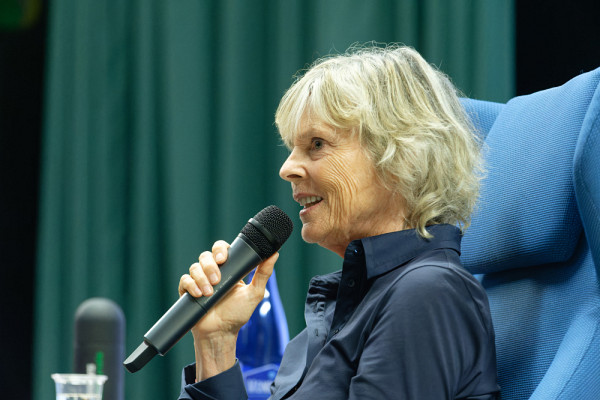
We want to try to convey everything we can from learning to become people ourselves and in society, in a global way today, care for ourselves, care for others and how we are challenged by the upheavals of today’s world. When we see this corridor opening up, this access road, let’s talk about our humanity and about becoming better human beings.
Can we really separate culture and education?
According to Hélène Dorion, the answer is no, otherwise we enter a world of confinement. For her, the school years are years of discovery and experimentation in order to learn as widely as possible what is available to us, both students and teaching staff.
I think that the professor teaches what he does not know as much as what he knows and that a person must convey his wonder as much as his knowledge.
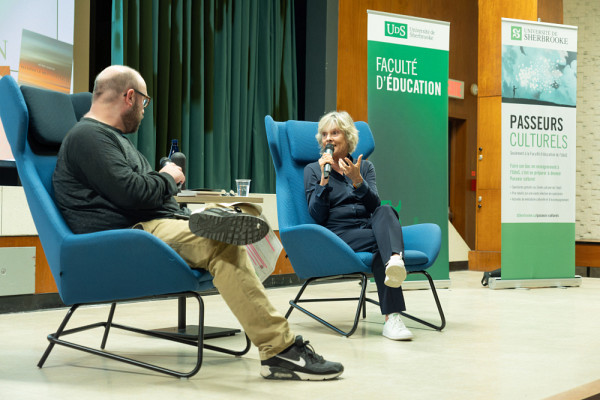
Hélène Dorion also tells us about what students can feel in class. She remembers the time when she was in a philosophy class at CEGEP and doesn’t know what the professor was talking about, but she remembers well what she felt at that moment.
It is in a transfer that is not only a transfer of knowledge, but also includes something else. There is always this reading from one human being to another, a reading that the students do in front of and with the teacher, beyond what they can name at that moment. Often the teacher is a great sower.
She became interested in poetry around the age of 15 thanks to her teacher: “At one point in poetry class, the teacher started circling the class with her eyes closed while reciting a poem. I wanted to see what she saw and feel it. »
For the poet, teaching is an art, a relationship of trust, dialogue and shock. A mistake you must not make when teaching poetry? She advises us to add an immediate experience to poetry: “It is certain that we must understand the basis, the grammar, but apart from that, when reading, we want to feel the work, receive and establish a direct connection with the text. » Generous advice that will surely help our students of the Faculty of Education!
Program Cultural Passeurs
With a new ambassador, the Cultural Passeurs program of the Faculty of Educational Sciences continues to grow. Intended to provide all members of the faculty community with access to culture in all its forms, the program is an exceptional privilege that is at the root of two fundamental skills of the educational professions, namely culture and language.
This is how the cultural PAKT is implemented with all members of the Faculty: we are pleased to multiply the opportunities for sharing around art, culture and education, offer privileged access to artistic experiences and different cultures, enable people to make personal choices for cultural discoveries, set aside time for art and culture in the daily base and finally create spaces, environments, places that are as stimulating as possible to introduce people to beauty, goodness and goodness.
The cultural opening on October 4 was carried out in cooperation with PRESE, that is, the Regional Center for Higher Education of Estrie, which promotes cooperation between colleges and universities in the region.
Helen Dorion she is the author of more than 30 works, and her work includes poetry, novels, essays and operas. She is the winner of several awards in her career and numerous recognitions. She has been a Knight of the National Order of Quebec since 2007 and an Officer of the Order of Canada since 2010. Recently, her collection of poems, My Forests (2021), was added to the selection for the French Baccalaureate, making Hélène Dorion the first Quebecois and the first living woman to be studied in this program.

